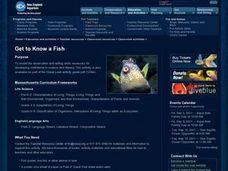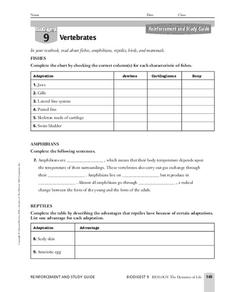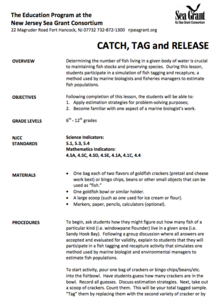Curated OER
Animal Movement in Water
Students explore oceanography by participating in field trip activities. In this fish characteristics lesson, students attend a trip to a local beach or reservoir and collect different specimens in order to examine them. Students...
Curated OER
Pacific Salmon and Mountain Pine Beetle
Learners compare fish anatomy. In this teacher demonstrated dissection lesson, students compare fish anatomy to that of humans. They explore different fish and their unique properties. There are 4 distinct activities which can be...
Curated OER
What Does it Take to be a Survivor? Part One
Young scholars explore marine animal adaptation. In this introductory ocean life biology instructional activity, students access prior knowledge by participating in a whole class "thought swap." Young scholars form two lines, respond to...
Curated OER
Fish Fashion 101
Learners explore fish anatomy. In this fish anatomy and adaptation lesson, students define and identify the location of fish body parts. Learners add these parts of a fish's anatomy to a life-sized fish costume worn by a student. ...
Curated OER
Investigating a Fresh Fish
Fourth graders investigate the anatomy of a fish. In this adaptations lesson plan, 4th graders look at fresh fish and identify their adaptations and decide where they think the fish may live. Students draw and label the fish and its...
Curated OER
Fish Shadow Match
In this shadows worksheet, students match the different fish with their shadows. Students match 6 fish with their shadows.
Curated OER
Plants and Animals
Students find common needs between plants and animals. In this plants and animals lesson students compare that both plants and animals need food and water. They also find the differences between plant and animal needs.
Curated OER
Schooling Fish
Students make fish models. In this fish behavior instructional activity, students create lanternfish fishsticks, learn how a school of fish live, eat and swim together, examine the predator-prey relationship, and read the book Swimmy to...
Curated OER
Get to Know a Fish
Students discover the anatomy of a fish by identifying its body parts. In this oceanography lesson, students view a live fish in their classroom and draw a poster of the fish one body part at a time while identifying it. Students...
Curated OER
A Fish Tale
Students conduct an experiment. In this fish lesson plan, students discover how fish cells respond to fresh and salty water and if temperature effect the movement of a fish's gills. Students also identify the characteristics of a fish.
Curated OER
School of Fish
Student explore the natural resources of Buffalo National River. In this natural resources activity ,students discuss the fish and other animals in the Buffalo River. Students discuss what they can do to keep the river clean to keep the...
Curated OER
Trout Cookies
Students explore the external anatomy of a fish. In this anatomy and adaptations lesson, students look at an image of a trout and identify its various external features including fins, eyes, spots, parr marks and lateral line. Students...
Curated OER
Salmon Homing Instincts
Students identify the stages of the salmon life cycle. In this fish instructional activity, students experience first hand what it would be like to be a returning salmon attempting to identify a home stream by smell.
Curated OER
Swimmy
Students explore the themes of the book Swimmy by Leo Lionni. In this literacy lesson plan, students dramatize a character from Swimmy and identify common themes such as cooperation and caring. Students create a new ending to the story.
Curated OER
Designing a Study
Students explore features to consider when designing a scientific study. For this science research lesson, students examine different methods of data collection and consider which method would be appropriate for determining how many...
Curated OER
A Fish Tale
Students investigate the lives of fish. In this biology lesson plan, students demonstrate how fish cells respond to fresh and salty water, determine the age of a fish and if temperature effects the movement of a fish's operculum (gill...
Curated OER
Vertebrates
In this vertebrate activity, learners review the different adaptations for the 5 groups of vertebrates: birds, mammals, reptiles, amphibians, and fishes. This activity has 12 matching, 1 fill in the blank, and 7 short answer questions.
Curated OER
How Many? Fishy Problems
In this math worksheet, students solve 6 word problems in which they calculate the answer to a question about fish. Students do the necessary operation to solve the problem and then draw a picture that demonstrates the problem.
Curated OER
Fish, Amphibians, Frogs
For this science worksheet, students use basic scientific concepts to complete the series of puzzles that are intended to increase science literacy for telling the differences between fish and amphibians.
Curated OER
Freshwater Fish Water Quality
Sixth graders work together to complete an experiment about the quality of freshwater. In groups, they collect fresh water samples from a variety of sources and test the pH levels. After completing a KWL chart, they test the amout of...
Curated OER
Build-A-Fish
Students identify the basic external anatomy of a fish. After identifying the parts of the fish, students explain the function of each body part and how it is related to the whole. They discover how the shape of a fish help to propel it...
Curated OER
Catch, Tag, and Release
Learners discover how fish tagging is used by marine biologists and fisheries to estimate fish populations. Participating in a simulation, learners use estimation to determine the whole population from a small number of items.
Curated OER
The Aquatic Environment
Fifth graders focus on the various types of fish living in different water environments. In groups, they research the different methods used to fish and participate in experiments to determine the effects of mercury on fish, the...
Curated OER
Adaptations of Fishes for Survival in Polar Environments
Students compare the anatomy of temperature and polar fishes. They explore the adverse effects of cold on metabolism and physiology and discuss how polar fishes adapt to their environments. Comparisons are also made to the DNA sequences...

























